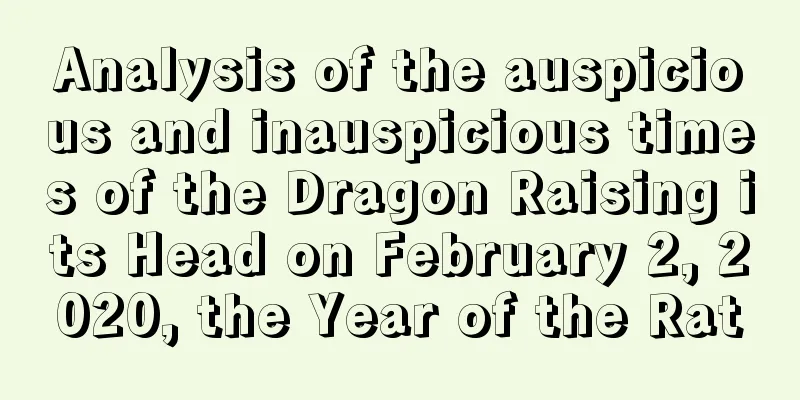Analysis of the auspicious and inauspicious times of the Dragon Raising its Head on February 2, 2020, the Year of the Rat

An analysis of the auspiciousness and inauspiciousness of the second day of the second month of the Year of the Rat in 2020. Naturally, the auspiciousness and inauspiciousness of different days and times are different. The second month of the lunar calendar is the Mao month, and Mao is the zodiac sign of the rabbit. The second month of the new year ushers in the solar terms Jingzhe and the Spring Equinox; for the special content of the second month of the lunar calendar in 2020, please remember to click on Mr. Shuimo’s website to check!Analysis of the auspicious and inauspicious times of the Dragon Raising its Head on February 2, 2020, the Year of the RatLunar calendar: February 2, 2020 Gregorian calendar: February 24, 2020, Monday, PiscesZi hour (23:00-00:59): Gengzi [auspicious] Seasonal occasion: Make a stove offering, pray for blessings, fast and offer sacrifices to the gods Taboo: Construction and groundbreaking Chou time (01:00-02:59): Xin Chou [unlucky] Suitable for: praying for blessings, seeking offspring, getting married, seeking wealth, opening the market, setting up the bed, offering sacrifices Taboo: Traveling to work or repairing buildings Yin time (03:00-04:59): Ren Yin [auspicious] Time: Nacai, marriage, bed setting, moving, house building, burial Taboos: Offering sacrifices, praying for blessings, fasting and offering sacrifices, consecrating, and taking office or traveling Mao time (05:00-06:59): Guimao [auspicious] Time: The sun is broken and everything is unfavorable Time taboo: The sun is broken and everything is unfavorable Chen time (07:00-08:59): Jiachen [Evil Ten Days Void] Suitable for: praying for blessings, seeking offspring, getting married, traveling, seeking wealth, opening the market, trading, setting up beds, offering sacrifices Taboo: Taking office Si time (09:00-10:59): Yi Si [unlucky Xunkong] Suitable for: praying for a son, getting married, opening the market, trading, and setting up the bed Unlucky time: Going to work, traveling, or seeking wealth . Noon (11:00-12:59): Bingwu [auspicious] Suitable for: praying for a son, seeking a wife, getting married, traveling, seeking wealth, opening the market, trading, setting up the bed, and taking up a new post Taboo: Putting up beams to build a house Wei time (13:00-14:59): Ding Wei [auspicious] Suitable for: praying for a son, getting married, building a new home, opening a business, burying, and offering sacrifices Taboos: No taboos at auspicious times Shen time (15:00-16:59): Wushen [unlucky] Time: Taboo: Praying for blessings and offspring You Hour (17:00-18:59): Jiyou [auspicious] Suitable for opening the market, moving into a new house, building a new home, setting up a bed, making a stove, offering sacrifices, praying for a son, getting married, burying a noble person Taboo: Building a ship, sailing, going on a trip to seek wealth Xu time (19:00-20:59): Gengxu [unlucky] Suitable for: Seeking wealth, marriage, adoption, and burial Taboos: Going to work, building, migrating, traveling Hai Hour (21:00-22:59): Xin Hai [Unlucky] Suitable for: praying for wealth and honor, offering sacrifices and praying for blessings to the gods Taboos: Going on a trip, building, or starting construction What is the Dragon Raising Festival?Dragon Raising its Head, a traditional Chinese festival, falls on the second day of the second month of the lunar calendar. It is also known as the Spring Ploughing Festival, Agricultural Festival, Green Dragon Festival, Spring Dragon Festival, etc. It is a traditional Chinese folk festival."Dragon" refers to the seventh star of the Eastern Azure Dragon among the twenty-eight constellations. At the beginning of the first month of mid-spring every year, the "Dragon Horn Star" rises from the eastern horizon, so it is called "Dragon Raising its Head". "The Dragon Raising its Head" is a reflection of the solar terms in ancient Chinese farming culture, indicating that yang energy is coming out from the ground, spring thunder is rumbling, rain is increasing, the temperature is rising, all things are full of vitality, and spring farming begins. Since ancient times, people have regarded the time when the dragon raises its head as a day to pray for blessings, good luck and good fortune. Fate determines one's entire life, while fortune determines one's current moment. In the method of fortune-telling based on the Eight Characters, the so-called fortune refers to the great fortune, which can be divided into forward and reverse fortune. Do you want to know when your good luck will come? Then take a look at the [ Excellent Calculation ] below, and may you have peace and happiness in your life! |
Recommend
Lunar calendar May 13th, 2018, is it a good day?
The fifth month of the lunar calendar in 2018 als...
Is it a good idea to pick up the car on September 24th of the lunar calendar in 2020? What does the hexagram look like?
Is it a good idea to pick up the car on September...
How about September 23rd of the lunar calendar in 2021? Can I move?
There are certain rules and regulations for the ti...
The third day of the first lunar month in 2018 is a good day according to the lunar calendar.
1. What day is the third day of the first lunar m...
Is it good for people born on the tenth day of the second lunar month? How is your fortune?
Introduction: Each of us has our own birth date an...
Is it good to give birth in May of the lunar calendar in 2022? Is it suitable for caesarean section? Which day is an auspicious day?
In the fifth month of the lunar calendar, the weat...
Is May 24, 2020 a suitable day for a haircut? Where is the lucky position of the God of Wealth on July 14?
Introduction: Haircuts also need to choose auspici...
Is it good to be born on the Dragon Boat Festival for a person of the Rabbit sign? What is the fate like?
The Dragon Boat Festival is the most important tra...
Can we go to the graves to worship our ancestors during the Lantern Festival on the 15th day of the first lunar month? What should we pay attention to when worshipping our ancestors?
The Lantern Festival is a lively day when families...
What is the date like on the second day of the sixth lunar month in 2018? Can I start renovations?
The groundbreaking of renovation is a major event ...
Is it a good idea to worship and pray on April 14th of the lunar calendar in 2022? Is it an auspicious day?
The fourth month of the lunar calendar is the plum...
Is it a good idea to start construction on the Minor Snow solar term on October 26, 2019? Check the auspicious date for breaking ground!
Groundbreaking is the first time the land is dug w...
Query the position of the God of Happiness at each time on the ninth day of the eighth lunar month in 2020
The eighth month of the lunar calendar is halfway...
Where is the God of Happiness on December 16, 2017?
2018 has just begun and the Year of the Rooster i...
What is the fate of a girl born on the fourth day of the tenth lunar month in 2022?
In the birth chart, the date of birth occupies a d...









